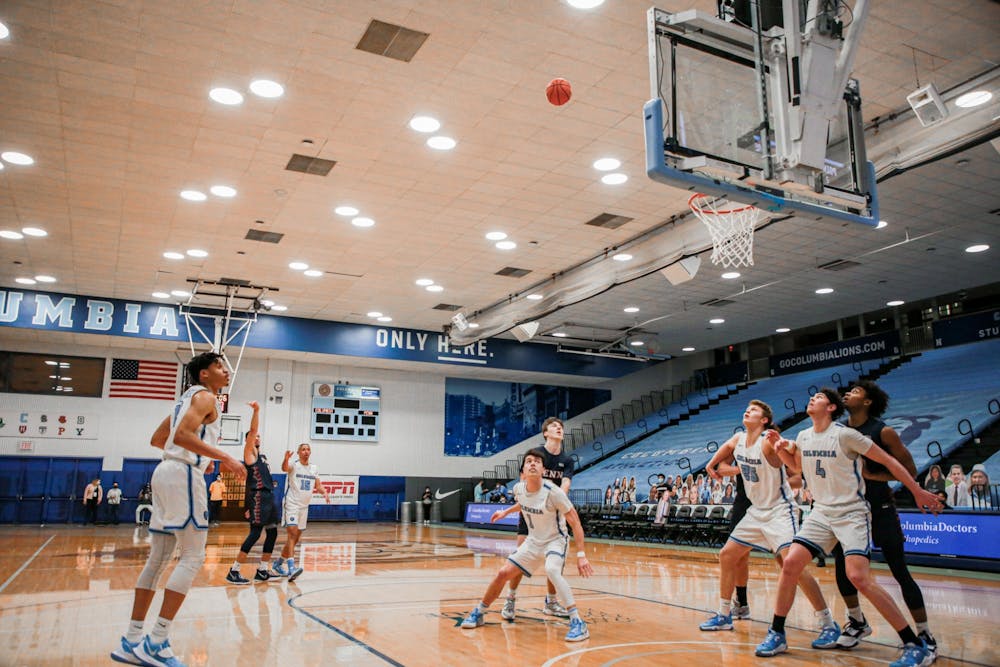
Not even Cornell’s barrage of heckling could stop the Quakers. On Saturday, Penn men’s basketball survived a late surge by Cornell to secure their second win of the weekend, 73-68. Here are some observations from the narrow victory:
1. Hitting open threes is essential. With the three-point shot as important as it is in the modern game of basketball, teams can’t afford to lose these opportunities. Against Columbia on Friday evening, the Quakers went a measly 5-24 from three; it was the team’s 62% shooting on two-point field goals that saved their night. Coach Donahue attributed this to a lack of confidence. That lack of confidence came back around on Saturday against Cornell.
Penn’s offense again moved the ball well, getting open looks for their shooters. However, Penn only shot 6-24 from three, including an abysmal 1-10 in the second half. At least a dozen of those were considered “open” looks.
But according to Donahue, Penn’s sharpshooters — such as Max Martz, Jonah Charles, and Clark Slajchert — will start to see their shots going in sooner rather than later. If the process is right, the shots will fall.
2. Speaking of looks at open threes, the defense is giving up too many of them. Often picking up in a full court press after made baskets, there naturally were some holes in Penn’s half-court transition defense.
The Big Red were able to move to the ball well to generate open looks from the three-point line without any Quakers closing out on them. Fortunately for Penn, Cornell was only able to convert 6-29 on three-point attempts, which was in part due to the stingy defensive adjustments made at the half.
3. But the defense wasn’t all bad. In reality, aside from the open threes given up in the first half, Penn was constantly hustling on the defensive end. Just as they did the previous night against Columbia, much of Penn’s early offense was sparked by their energy on defense. Penn was able to score 19 points off of 17 turnovers.
It’s not just the stats that say it. Penn’s defense passed the eye test as well. Players gang-rebounded, crashed the offensive glass, communicated well, had active hands, and were diving for loose balls. Penn’s star guard Jordan Dingle, for one, was on the ground a number of times lunging for 50-50 balls. When the leader of a team is making the little effort plays, it rubs off on the rest of the team. Dingle set the tone for Penn's hustle.
Columbia and Cornell “crushed us on the glass at our place, and so we talked about how important rebounding was,” Donahue said, highlighting the team’s recent emphasis on rebounding. Against Cornell, Penn out-rebounded the Big Red 45-40.
4. The center rotation has been put in a crunch lately. Missing big men Max Lorca-Lloyd and Michael Wang, Donahue has elected to start Michael Moshkovitz. His backup? Freshman Nick Spinoso.
Spinoso’s hustle on the defensive end and passing ability out of the post on offense has opened up new doors for Donahue. Against Columbia and Cornell, however, Spinoso has struggled to produce.
The Red and Blue could certainly use Lorca-Lloyd and Wang back in the rotation soon. Until then, Donahue has rolled out a new lineup to fill the void.
5. Without a center to anchor the second unit, Donahue’s small-ball lineup has dominated the court. For small-ball to be successful, a team needs five perimeter players who can all shoot it from deep. By employing either Jelani Williams or Max Martz at what would be the center position, the Quakers have just that.
The other key to Penn’s small-ball success? The emergence of sophomore guard-forward Andrew Laczkowski. Providing a nice offensive spark, Laczkowski scored 22 points, including 3-6 from three over the two games at Columbia and Cornell. Against Cornell, Laczkowski notched a game-high +18 in the plus/minus.
“You could see he had some nervous energy some of these games,” Donahue said after the Columbia game. “But every day in practice, he’s hustling, he’s making shots, he’s cutting, he plays with great energy, and he’s got good size.”
With the way Laczkowski has been playing the past few games, it won’t be long before he’s a consistent regular in Penn’s lineup.
The Daily Pennsylvanian is an independent, student-run newspaper. Please consider making a donation to support the coverage that shapes the University. Your generosity ensures a future of strong journalism at Penn.
Donate






